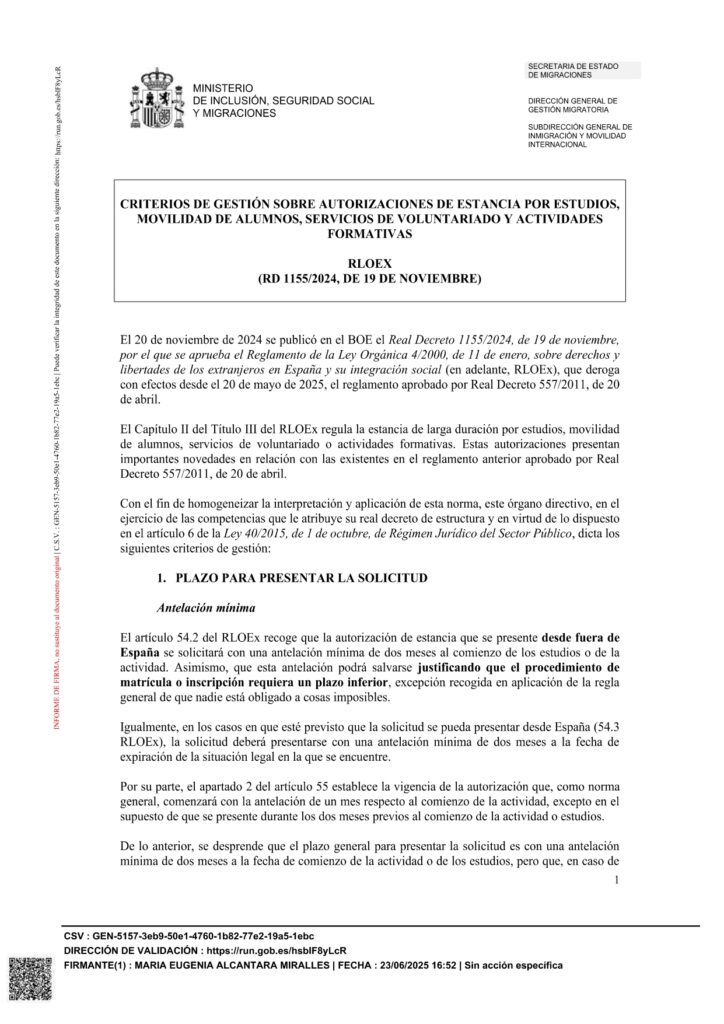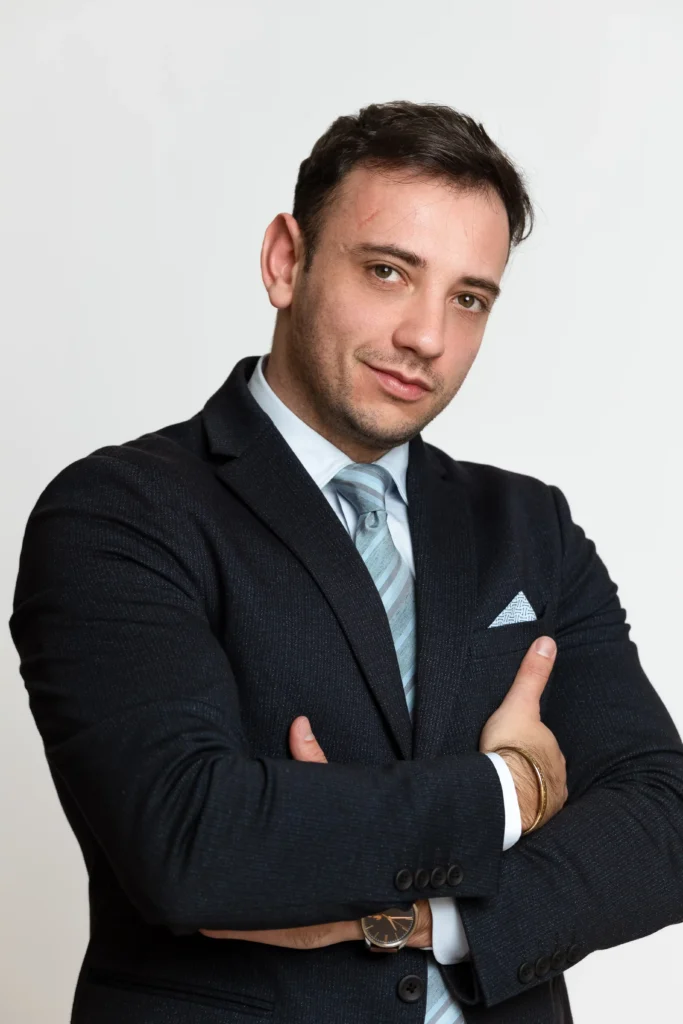The new Immigration Regulation, approved by Royal Decree 1155/2024 and in force since May 2025, introduces significant changes in authorizations for student visa, student mobility, volunteering, and training activities. This definitive guide, based exclusively on the 19 official interpretative criteria, provides a clear and comprehensive tool for foreign students planning their academic project in Spain.

1. Deadline for Submitting the Study Stay Application
Applications must be submitted at least two months before the start of the academic program. However, exceptions are allowed if it is documented that the admission process takes less time, particularly when initiated abroad through a visa application.
Important! There is no maximum deadline. However, the authorization will take effect one month prior to the start of the activity. Applying too early may pose a problem if the applicant is in Spain on a short-term visa, as it may lead to irregular status.
2. Minimum Age According to the Definitive Guide
The general age to pursue higher education is 18 years, but applications can be made from 17 years old if submitted at a consulate. Additionally, underage individuals with certified high intellectual capacities are eligible. In other cases, only the following options are admissible:
-
Secondary education mobility programs
-
Temporary humanitarian schooling
-
Higher education programs under the RLOEx
3. Duration of Studies or Activity
The activity must last at least 91 calendar days. Authorizations are granted for the official length of the studies, up to one year, except for higher education or specialized health training, which are granted for the full duration of the program.
For example, according the definitive guide, if a degree program lasts four years, the stay will be authorized for the entire duration, from the very first application.
4. Full-Time Requirement
The student must be enrolled in at least 90% of the study plan or credits. For higher or non-formal education, a minimum of 20 hours/week, or 12 in-person hours for intensive programs, is required.
For language studies, the specific program rules apply. Semester-based enrollment is allowed if the minimum duration is met.
5. Financial Means
Applicants must demonstrate funds equal to 100% of the monthly IPREM, unless full accommodation has already been paid. Proof of resources can include:
-
Personal or family funds
-
Grants or scholarships
-
Employment contracts (if authorized to work)
Accommodation provided by relatives up to the second degree is accepted, provided the relationship and a sworn statement of support are proven.
6. Maintenance of Requirements
Throughout the stay, the following must be maintained:
-
Sufficient economic means
-
Active enrollment
-
Comprehensive private health insurance (no copays or gaps), with a minimum €30,000 coverage
If the student works and is enrolled in the Social Security system, this covers the health insurance requirement. Proof must be submitted at the beginning of each academic year.
7. Enrollment Requirements
Partial payment or proof of installment payment is accepted. The program must be officially authorized by the center. It is not enough for the center to be registered if the specific program is not part of its accredited offering.
8. University-Specific Programs (Títulos Propios)
Custom programs from universities and accredited higher artistic education centers are allowed. They must be clearly distinguished from official certifications to prevent confusion or fraud.
Documents may be requested, such as:
-
Minutes from the academic board or equivalent body
-
Program structure, available spots, and curriculum
-
Faculty information and tuition costs
9. Outsourcing of Education
Only universities may outsource training through formal agreements with other centers. Documentation of the agreement and oversight from the primary institution are required. This especially applies to language programs resulting in university-issued certificates.
10. Payment of Fees
Depends on the place of application:
-
From abroad: visa fee
-
From Spain: stay authorization fee
Payment is mandatory in both cases.
11. Mobility in Secondary Education
Covers school exchanges and educational projects. The hosting institution must guarantee:
-
Full care of the minor
-
Accommodation in a family or boarding school
-
Program funding
Additionally required:
-
Notarized parental authorization
-
Consent for accommodation arrangements
-
Local contact person in Spain (if hosted in a boarding school)
12. Curricular Internships
If internships are part of the study plan, no additional permit is needed. They are considered part of the study stay. If the internship is with a company, the application must be submitted to the Foreign Office corresponding to the company’s location.
13. Foreign Education Programs in Spain
Programs that grant recognized degrees from other countries are valid if the institution is:
-
Authorized in Spain, and
-
Officially registered
For language programs, only centers accredited by the Cervantes Institute or their regional equivalents are accepted.
14. Family Members
Family members (partners, minor children, etc.) can apply jointly and be granted authorization simultaneously—but only in cases of higher education or specialized health training.
They follow the same legal status as the student and must show additional financial means.
According to the definitive guide, these applications can be made directly from Spain together with the student’s application.
15. Extensions (Prórrogas)
Authorizations are not renewed, they are extended under the following conditions:
-
Up to 2 extensions for higher/post-compulsory education
-
1 extension for volunteering or training activities
-
No extensions for secondary mobility programs
Applications must be submitted electronically (Mercurio platform) to the same office that issued the original authorization. An extension may be denied if misuse is detected, such as working without studying.
It is essential to justify the official duration of the study and the academic year for which the extension is requested.
If extensions are exhausted, a new initial authorization may be requested.
Activities under Article 55.1 of the RLOEx can be extended if they fall under the same category (Article 52):
-
Higher education (52.1.a)
-
Post-compulsory secondary education (52.1.b)
-
Volunteering (52.1.d)
-
Foreign language assistants (52.1.e.1º)
-
Spanish or co-official language courses (52.1.e.2º)
-
Preparatory courses for specialized health training exams (52.1.e.3º)
-
Technical/professional certification (52.1.e.4º)
-
Professional certificates (FP, level 2 and 3) (52.1.e.5º)
-
Technical/professional certification (52.1.e.4º)
-
Professional certificates (FP, level 2 and 3) (52.1.e.5º)
So, if you finish a bachelor’s degree and want to start a master’s or PhD—both being higher education—it is sufficient to request an extension, no need for a new authorization.
16. Switching from Temporary Residence
Applying for a study stay automatically terminates a prior residence permit.
There is no irregular status as long as the new application is submitted on time and legal status is maintained during the process. This also applies to family members.
17. Termination of Authorization
Authorization ends if:
-
The student stops studying or changes the purpose of stay (e.g., works only)
-
The institution loses recognition
In such cases, changing institutions is allowed without a new visa, as long as valid enrollment is proven.
18. Consular Applications
Applications submitted at consulates must be resolved within 7 working days. Administrative silence is considered a denial, so an express resolution is mandatory.
19. Modification to Residence and Work (or Residence without Work Authorization)
Graduates may apply for residence and work authorization, unless they were funded by cooperation scholarships.
Required:
-
Proof of graduation
-
Sworn statement (if documentary proof of no grant is unavailable)
Pending applications under the previous regulation (RD 557/2011) will be processed according to the new RLOEx.
Conclusion: Practicality and Legal Certainty
This definitive guide allows for more accurate interpretations of the law, removing excessive or ambiguous interpretations of the legal text. It significantly simplifies the work of legal professionals and allows foreign nationals to submit their authorizations, modifications, or extensions with greater legal security.
Do you have questions about studying and legally residing in Spain?
Did the new Immigration Regulation and its definitive guide seem too complex or technical?
At Guilherme Cesar Immigration Lawyer, we help you understand the process and take care of your student visa application in a clear, secure, and legally compliant way. Contact us to receive expert legal advice and support throughout every step of your application.

